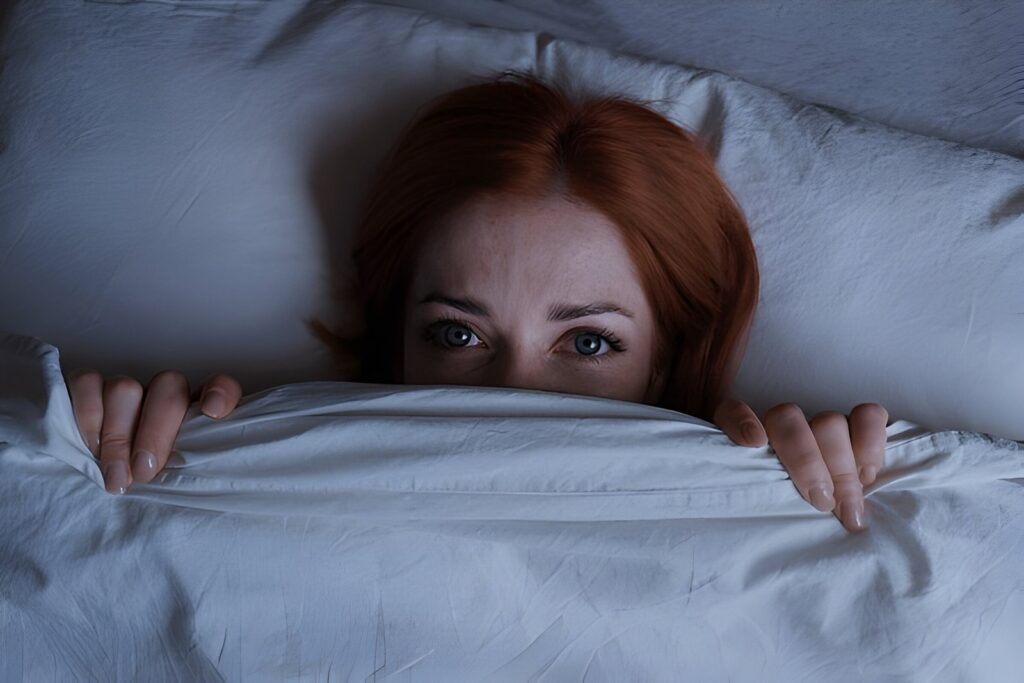- KNOWLEDGE BASE
- EATING DISORDERS
- General Topics
- No posts found for the specified taxonomy and term.
- General Topics
- EATING DISORDERS

SWISS MEDICAL EXPERTISE: ZURICH, MALLORCA, LONDON, MARBELLA


CONDITIONS WE TREAT
PROGRAMS
Intensive residential treatment program starting from 4 weeks. Location: Mallorca, Zurich, London.
Comprehensive second opinion assessments for both psychiatric and general health concerns. Location: Mallorca, Zurich, London
ADDITIONAL INFORMATION





10 Minutes
Anxiety that intensifies at night is a common but deliberating experience for many as it impacts the ability to rest and sleep peacefully. As the day ends and all the outside world’s distractions diminish, people often get more anxious as they tend to focus solely on stressful thoughts and worries. The phenomenon of nighttime anxiety is challenging for most as it becomes a hurdle in the process of winding down, leading to problems in falling or staying asleep throughout the night.
Contrary to popular belief, nighttime anxiety is not an extension of the stress experienced during the day. A separate issue arises when a person has more time to focus without any external distractions. This free time allows individuals to focus only on unresolved thoughts, causing heightened alertness and making it difficult to prepare for sleep. The quiet of the night, typically deemed as peaceful and the ideal time to rest by the majority, paradoxically becomes a breeding ground for anxious thoughts, making the period before sleep significantly uncomfortable.
Despite its occurrence among many people, nighttime anxiety’s unique aspects are widely unknown. This article focuses on nighttime anxiety, which is essential for developing effective management strategies.
Anxiety often worsens at night due to several reasons. Usually, individuals experience increased stress levels due to one or more of the following reasons:
Managing anxiety at night is integral to achieving restful sleep and maintaining overall health. Individuals struggling with the issue can naturally adopt several ways to make a significant difference. Some of these ways are as follows:
Creating a consistent bedtime routine is among the most effective ways to control anxiety before bedtime. A regular routine serves as an indicator of relaxing and sleeping to the mind and body. A structured bedtime routine can include calming activities like reading, meditating, or stretching gently. The key is to choose any activities that assist in taking the focus away from anxious thoughts and place it on relaxing. By following the same routine every night, people can train their minds to link any preferred activities with sleep, making it easy to fall and stay asleep.
Deep breathing exercises are efficient for controlling anxiety. When people become anxious, they experience rapid or shallow breathing, which adds to panic and discomfort. Taking slow and deep breaths can activate the parasympathetic nervous system in such a situation. The parasympathetic nervous system can promote relaxation and ease the physiological symptoms of stress. One common technique is the 4-7-8 breathing method. A person is supposed to inhale deeply for four seconds, hold the breath for seven seconds, and exhale slowly for eight seconds to calm down. Research conducted on 4-7-8 methods shows that repeating this exercise several times can also aid in slowing the heart rate and lowering blood pressure, making it easier to fall asleep [1].
Exposure to screens, such as televisions, laptops, and smartphones, before bed, contributes to nighttime anxiety. The blue light emitted by the screens affects melatonin production, the hormone that regulates sleep. Additionally, studies show that looking at stimulating content, including news, whether it is on social media or television, can make an individual even more anxious and disturb the sleep pattern [2]. For better sleep, experts recommend turning off all screens at least an hour before bedtime. Instead, consider calming activities such as reading a book, listening to soothing music, or practicing mindfulness meditation. Reducing screen time before bed can help regulate the body’s natural sleep-wake cycle and decrease anxiety.
Mindfulness meditation is a popular technique for all kinds of anxiety. It involves focusing on the present moment and observing thoughts and feelings without judgment. By maintaining a non-reactive awareness of anxiety, this practice can reduce the impact of anxious thoughts and keep them from spiraling even further. To add mindfulness meditation before bed, find a quiet, comfortable space to lie down. Close your eyes and take a few deep breaths, then shift your attention to the sensations of your breaths as they move in and out of the body. If your mind starts to go somewhere else, bring your focus back to breathing gently. Practicing mindfulness daily can calm the mind and make it easier to sleep.
Aromatherapy is the use of essential oils to promote relaxation and well-being. It is used for many reasons, one of which is to relieve anxiety at night naturally. Certain essential oils, such as lavender, chamomile, and bergamot, have been widely used because of their calming properties. These oils can also help create a soothing environment for better sleep. You can incorporate aromatherapy into your bedtime routine in different ways, like:
According to research, essential oils’ gentle, pleasant scent can help relax the mind and body, making it easier to fall asleep and improving sleep quality. [3]
Progressive muscle relaxation (PMR) involves tensing and slowly releasing every muscle group in the body, beginning from the toes and moving toward the head. PMR is a technique used by many to release physical tension to ease distress while promoting mental relaxation simultaneously. To practice PMR, lie in a comfortable position in a quiet place. Close your eyes and start by tensing the muscles in the toes, holding the tension for a few seconds, and then releasing it slowly. Repeat the technique with muscles in the calves, thighs, abdomen, chest, arms, and face. As the tension is released, focus on the feelings of relaxation spreading through the body. Doing this as a part of the routine can prepare the body for restful sleep and control anxiety effectively.
Diet plays a crucial role in managing anxiety, specifically during the nighttime. Maintaining a nutritious, balanced diet that includes whole foods, including fruits, vegetables, lean proteins, and whole grains, can support overall physical and mental health, thereby reducing anxiety. Remember that it is also essential to avoid consuming stimulants like caffeine and nicotine before bedtime, as these substances can disrupt sleep and contribute to anxiety. Instead, individuals can opt for beverages that promote healthy sleep, such as herbal teas like chamomile or valerian root tea. Keeping the diet healthy and avoiding stimulants can create a more conducive space for sleep and decrease nighttime anxiety.
The environment in which a person sleeps has a significant impact on anxiety levels. A cluttered, unhygienic, loud, or uncomfortable sleeping space can exacerbate anxiety and make it difficult to calm down. To create a suitable space for sleeping, ensure that the bedroom is quiet, clean, and dark. If there are any disturbances from outside, consider using blackout curtains, earplugs, or a white noise machine. Moreover, invest in good-quality mattresses and pillows that provide the comfort needed for a good night’s sleep. A peaceful and comfortable environment can reduce anxiety and improve sleep quality significantly.
By using these natural strategies in the nightly routine, people can effectively relieve anxiety at night and sleep peacefully.
If natural methods no longer help in controlling nighttime anxiety, professional help may be needed. Consistent anxiety that disrupts sleep and daily functioning can be a symptom of a more serious underlying issue that requires targeted intervention.
When stress reaches an unmanageable stage, professional treatment can provide the necessary tools and resources needed to address the underlying causes and alleviate the anxiety. Various forms of professional help can help with the condition, such as:
When anxiety at night becomes unmanageable and affects everyday life, getting professional help is necessary for recovery. With comprehensive care, it is possible to control nighttime anxiety, achieve better sleep, and optimize mental health.
To quickly manage nighttime anxiety, combine physical relaxation methods with mental distraction. Begin by getting out of bed and engaging in a calming activity in low light, such as reading a non-stimulating book or practicing light stretching. This disrupts the anxious thoughts associated with being in bed. Additionally, try the “5-4-3-2-1” grounding technique. Using this method, you need to identify five things you can see, four things you can touch, three things you can hear, two things you can smell, and one thing you can taste. The technique will engage your senses and shift focus away from anxious thoughts.
Medication is not required in all cases of nighttime anxiety, and many people successfully manage their stress through therapy, lifestyle changes, and relaxation techniques. However, in cases of severe anxiety, medicines may be recommended by a healthcare provider. Remember that medication should only be used under the supervision of a healthcare professional. Do not take any medication for relieving anxiety on your own.
For relieving nighttime anxiety in children, a consistent bedtime routine that can include reading a calming story or dimming the lights is crucial. Encourage deep breathing exercises that are easy for children, such as “balloon breathing,” where they imagine inflating a balloon in their belly with each breath. Like a favorite toy, a comfort object can also help reduce anxiety. Moreover, addressing any fears or concerns the children have before bed can keep these worries from transforming into anxiety. If the anxiety continues or is severe, talk to a pediatrician or child psychologist for further guidance.
COGNIFUL is a leading provider of luxury addiction and mental health treatment for affluent individuals and their families, offering a blend of innovative science and holistic methods with unparalleled individualised care.
We believe in the healing power of a community that brings together collective wisdom and individual insight from collective group sessions and activities. We offer a variety of activities and therapies, from group workshops to communal living experiences, every aspect of our program is designed to foster growth, understanding, and self-improvement.
more infoOur program is uniquely designed to meet your needs, with our team closely monitoring your progress. Our therapists are committed to addressing the underlying causes of your challenges, not just the surface symptoms. This deep, root-level therapy extends beyond your stay with us, ensuring enduring success and well-being.
more infoOur team of specialists integrates the most effective strategies from psychological care and holistic medicine, offering you personalized support. This approach includes a range of complementary therapies, all seamlessly coordinated to work together in a comprehensive, integrative manner for your benefit.
more infoThroughout your stay, our dedicated team will ensure a personalized and nurturing experience, providing continuous support and attention. We are committed to guiding you through every step of this transformative journey.
more infoNestled in a serene location close to the calming embrace of the beach, our luxury residence is designed with healing in mind, featuring private suites that offer an oasis of tranquility. Each suite is crafted to provide a personal sanctuary where individuals can reflect, rejuvenate, and recover in peace.
more infoComplex trauma frequently underlies both mental and physical distress. We offer a secure environment, incorporating integrated trauma treatment techniques to facilitate the healing process.
more info